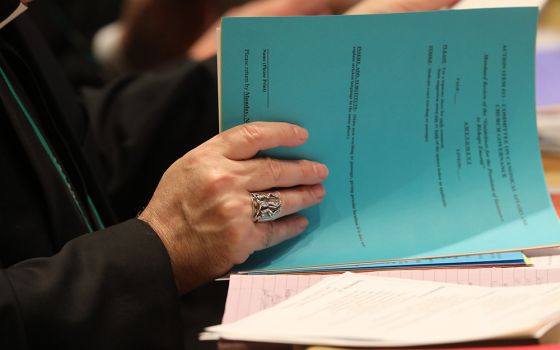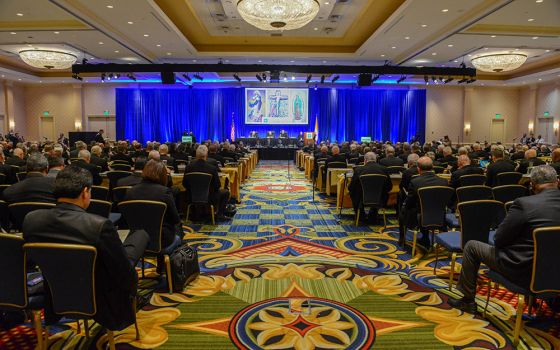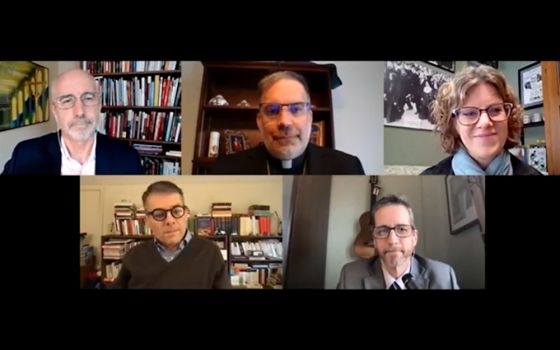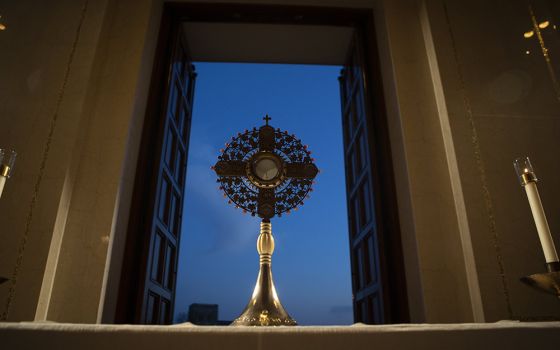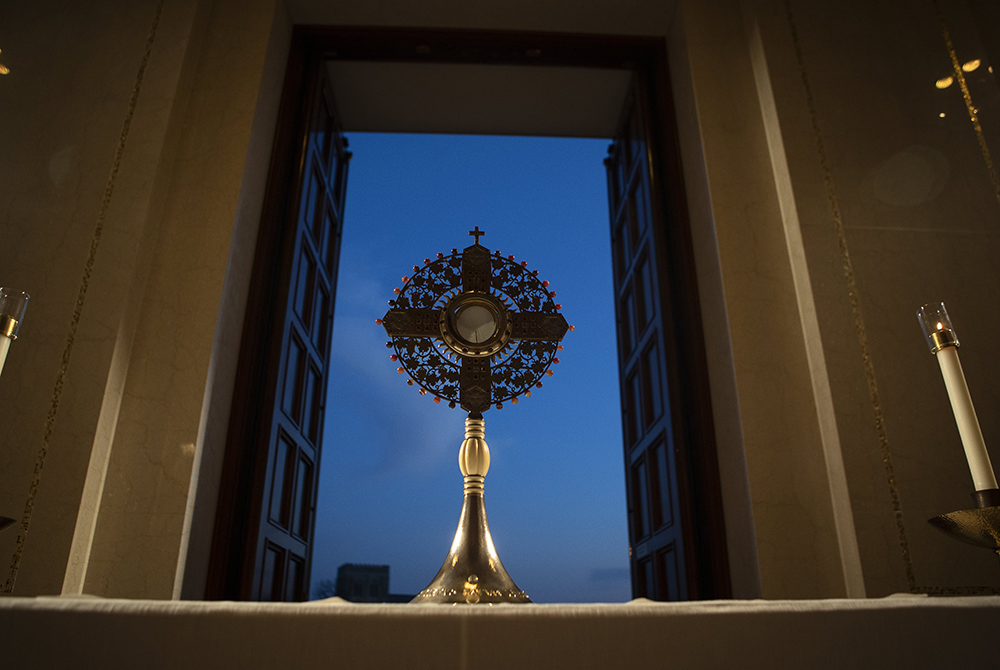
A monstrance holding the Blessed Sacrament for eucharistic adoration is seen at the Basilica of the National Shrine of the Immaculate Conception March 11 in Washington. (CNS/Tyler Orsburn)
What makes our bishops think they own the Eucharist?
While the question may sound flip, this is something I have been pondering in the weeks leading up to the November meeting of the U.S. Conference of Catholic Bishops in Baltimore. At this meeting, the leaders of the Roman Catholic Church in the U.S. will consider issuing a letter on the Eucharist.
It had been widely expected that the letter could endorse prohibiting Catholic politicians who support legal abortion from receiving Communion. At times, politicians who support marriage equality and other legal protections for LGBTQ+ people are also threatened that Communion will be withheld from them, but the current debate seems to center on abortion.
A leaked draft of the letter, dated Sept. 24, seems less explicitly directive than some had feared, and others had hoped. Of course, we do not know what discussions during the bishops' meeting will yield, but the version sent to bishops for their review prior to the meeting frames the issue of political divergence from church teaching by quoting Pope John Paul II's statement that:
" … in cases of outward conduct which is seriously, clearly and steadfastly contrary to the moral norm, the Church, in her pastoral concern for the good order of the community and out of respect for the sacrament, cannot fail to feel directly involved. The Code of Canon Law refers to this situation of a manifest lack of proper moral disposition when it states that those who 'obstinately persist in manifest grave sin' are not to be admitted to Eucharistic communion."
My reflections on this question have led me to believe the bishops' sense of ownership, and therefore the right to determine worthiness to receive the Eucharist, is rooted in the institutionalization of the sacrament. What we now know as Holy Communion originated in a home-based religious ritual, the Passover Seder, which is still a sacred celebration marked by Jews and friends in their homes.
In the early days of the Christian movement, the sharing of the body and blood of Christ was essentially a house church function. It took myriad forms, was probably most often embedded in a community meal, and was a way of fortifying a minority community in their identity and mission.
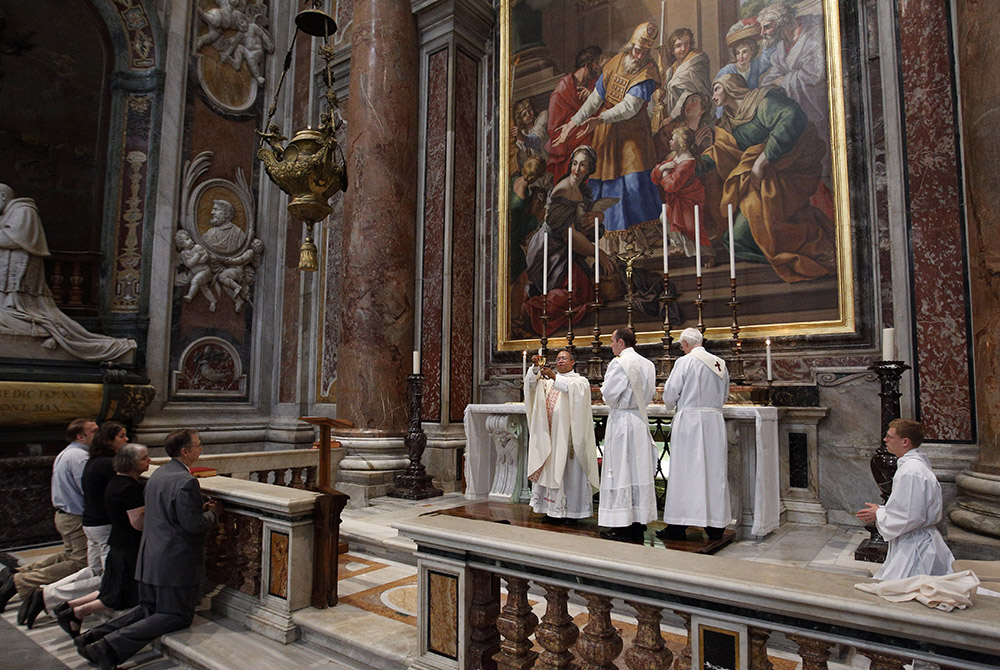
A priest holds the Eucharist as he celebrates a private Mass at a chapel in St. Peter's Basilica at the Vatican in this Oct. 8, 2011, file photo. (CNS/Paul Haring)
Over the centuries, as Christianity and its proponents became first accepted and eventually embraced by the ruling powers of Europe, the rites of Christians took on many of the trappings of these rulers. Eucharist became farther and farther removed from the community. It became something highly ritualized and administered only by the clerical caste.
What started as a very earthy ritual, using familiar items and words, became shrouded in mystery and taboo, administered with dramatic costumes and movements, limited to spaces not accessible to the general public, locked away in special golden boxes, and venerated when held aloft in ornate monstrances. All of this has contributed to the sense of distance most Catholics have from the Eucharist, seeing it truly as something we "receive," rather than something we are vitally and essentially part of creating, sharing, and responding to. Something we are — the body of Christ.
In fact, as theologian Thomas Groome wrote in his 1991 volume Sharing Faith: A Comprehensive Approach to Religious Education and Pastoral Ministry, the Eucharist "is the work of the whole community. By the power and presence of the Holy Spirit in the community, the assembly acts in union with Christ to realize again the Risen One's eucharistic presence in its midst."
Centuries of ceding control of the Eucharist to priests and bishops has led most Catholics to the point that we do not question church officials' right to make decisions about how the sacrament is administered. We may, as research has shown, largely object to the use of Communion as a coercive cudgel against politicians, by threatening to exclude from the sacred table those who dare to resist imposing Catholic dogma on a pluralistic country.
Advertisement
Many of the politicians potentially impacted by any ban that may be instituted by the U.S. bishops have spoken about their personal commitment to the church, and some acknowledge a personal opposition to abortion. The draft letter says that "Lay people who exercise some form of public authority have a special responsibility to embody Church teaching in their service of the common good." The text goes on to name the unborn and the elderly as vulnerable in a "throwaway culture."
However, the text goes on to enumerate a host of ills that "we all" (public leaders and the rest of us) must address that are "in conflict with the life and dignity of the human person." The long list includes numerous types of poverty, injustice and violence. Catholics charged with making and enforcing public policy often reach different conclusions about the best path forward than do church officials, even as they use Catholic social and moral teaching as a touchstone in their discernment. This dynamic is understood by the majority of Catholics, who also understand the centrality of the Eucharist in the lives of Catholics, and who believe that denying Communion to politicians is wrong.
In addition to creating unfortunate and unnecessary distance between Catholics and the Eucharist, the institutionalization of the Eucharist has larger effects in the lives of believers. It contributes to the dualism with which we approach the world, seeing everything in it as either sacred or profane. It removes the sense of sacramentality and holiness from our everyday lives, segregating what is holy to places under clerical control. It denies us the capacity to name and claim those abundant moments of grace with the power they deserve. It deprives us of the ability to celebrate moments of deep and inspiring connection with others as eucharistic.
The impending debate at the bishops' conference could have significant implications for a number of high-profile Catholics. However, the institutionalization of the Eucharist has ramifications for the spiritual health of millions of Catholics every single day. Perhaps it's time we consider not only the current debate, but the ways in which the Eucharist and all of our sacraments have been instrumentalized by the church's hierarchy and removed from our daily lives.




